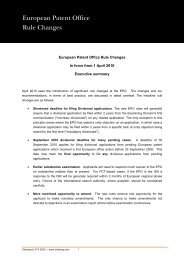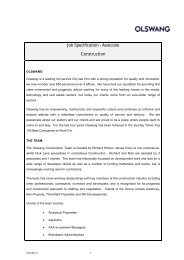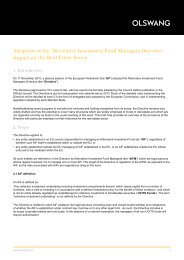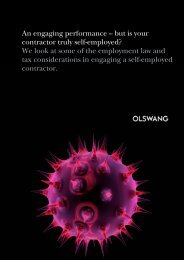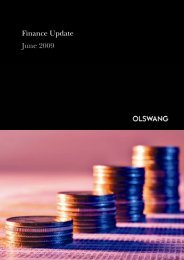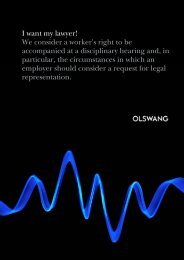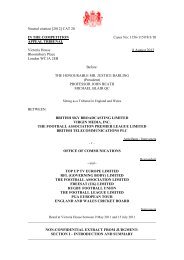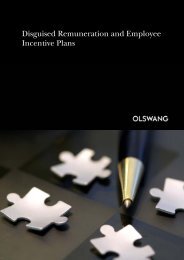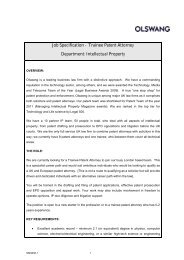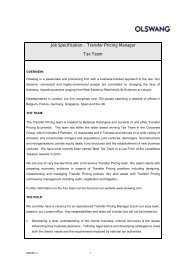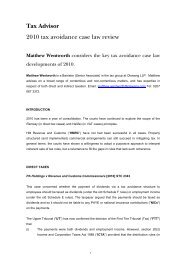Case C-406/08 Uniplex (UK) Ltd v NHS Business ... - Olswang
Case C-406/08 Uniplex (UK) Ltd v NHS Business ... - Olswang
Case C-406/08 Uniplex (UK) Ltd v NHS Business ... - Olswang
Create successful ePaper yourself
Turn your PDF publications into a flip-book with our unique Google optimized e-Paper software.
<strong>Case</strong> C-<strong>406</strong>/<strong>08</strong><br />
<strong>Uniplex</strong> (<strong>UK</strong>) <strong>Ltd</strong> v<br />
<strong>NHS</strong> <strong>Business</strong><br />
Services Authority<br />
Kassie Smith<br />
04 February 2010
The national rule in issue<br />
Regulation 47(7)(b) of the 2006 Regulations<br />
(before amendment by the 2009 Regulations):<br />
“Proceedings under this regulation must not be<br />
brought unless –<br />
…<br />
(b) those proceedings are brought promptly and<br />
in any event within three months from the<br />
date when grounds for the bringing of the<br />
proceedings first arose unless the Court<br />
considers that there is good reason for<br />
extending the period within which<br />
proceedings may be brought”.
The facts<br />
• Framework agreement for the supply of haemostats.<br />
• 18 July 2007 - <strong>Uniplex</strong> submitted its tender.<br />
• 22 November 2007 - <strong>NHS</strong> letter to <strong>Uniplex</strong>.<br />
‣ set out award criteria, with corresponding weighting, and<br />
indicated the names of the successful tenderers, the range<br />
of successful scores and <strong>Uniplex</strong>'s evaluated score -<br />
informed <strong>Uniplex</strong> of its right to challenge the decision, of<br />
the mandatory 10-day standstill period, and of <strong>Uniplex</strong>'s<br />
entitlement to seek an additional debriefing.<br />
• 23 November 2007 - <strong>Uniplex</strong> requested a debriefing.<br />
• 13 December 2007 - <strong>NHS</strong> replied.<br />
‣ details of its approach to the evaluation of the award<br />
criteria for the successful tenders in relation to <strong>Uniplex</strong>'s<br />
tender.<br />
• 28 January 20<strong>08</strong> - <strong>Uniplex</strong> letter before action.<br />
• 12 March 20<strong>08</strong> - <strong>Uniplex</strong> issued proceedings.<br />
‣ <strong>Uniplex</strong> sought (i) a declaration that <strong>NHS</strong> had breached the<br />
applicable public procurement rules and (ii) damages.
The reference by the High<br />
Court<br />
• Questions referred:<br />
‣ When does time for bringing<br />
proceedings start to run?<br />
‣ How is a court to apply the<br />
requirement for promptness?<br />
‣ How is a court to exercise its<br />
discretion to extend the time<br />
limit?
The judgment of the Court<br />
of Justice<br />
First question:<br />
• “The period for bringing proceedings seeking to have<br />
an infringement of the public procurement rules<br />
established or to obtain damages for the infringement<br />
of those rules should start to run from the date on<br />
which the claimant knew, or ought to have known, of<br />
that infringement”.<br />
‣ Not good enough for tenderer to find out that its tender<br />
has been rejected, “[s]uch information is insufficient to<br />
enable [it] to establish whether there has been any<br />
illegality which might form the subject matter of<br />
proceedings”.<br />
‣ It is only once it has been informed of “reasons for its<br />
elimination” that it “may come to an informed view as to<br />
whether there has been an infringement of the<br />
applicable provisions and as to the appropriateness of<br />
bringing proceedings”.<br />
‣ Requirement for contracting authorities to notify<br />
tenderers of reasons for decision – in old Remedies<br />
Directives and in new Remedies Directive.
The judgment of the Court<br />
of Justice: contd<br />
Second question (first part):<br />
• The provision which requires proceedings<br />
to be brought "promptly" is precluded by<br />
Directive 89/665.<br />
‣ Principles of legal certainty and effectiveness.<br />
‣ The “promptly” requirement gives rise to<br />
uncertainty.<br />
‣ “[A] limitation period, the duration of which is<br />
placed at the discretion of the competent court,<br />
is not predictable in its effects”.
The judgment of the Court<br />
of Justice: contd<br />
Second question (second part)<br />
• Directive 89/665 requires the national court, by<br />
virtue of the discretion conferred on it, to extend<br />
the limitation period in such a manner as to ensure<br />
that the claimant has a period equivalent to that<br />
which it would have had if the period provided for<br />
by the applicable national legislation had run from<br />
the date on which the claimant knew, or ought to<br />
have known, of the infringement of the public<br />
procurement rules. If the national provisions do<br />
not lend themselves to an interpretation which<br />
accords with Directive 89/665, the national court<br />
must refrain from applying them
The impact: the new<br />
procedural rules<br />
Regulation 47D of the 2006 Regulations (as<br />
amended):<br />
“(2) Subject to paragraphs (3) and (4), such<br />
proceedings must be started promptly and in<br />
any event within 3 months beginning with the<br />
date when the grounds for starting the<br />
proceedings first arose.<br />
…<br />
(4) The Court may extend the time limits<br />
imposed by this regulation … where the Court<br />
considers that there is good reason for doing<br />
so.”
The impact of <strong>Uniplex</strong><br />
• No more requirement for<br />
“promptness”.<br />
• How to establish that the applicant<br />
“knew or ought to have known”?<br />
• Of what exactly must the applicant<br />
have knowledge?<br />
• How does this interact with the new<br />
requirement for a Regulation 32(1)<br />
notice?<br />
• What about new Regulation 29A<br />
notices?
Thank You<br />
For more information<br />
www.monckton.com






